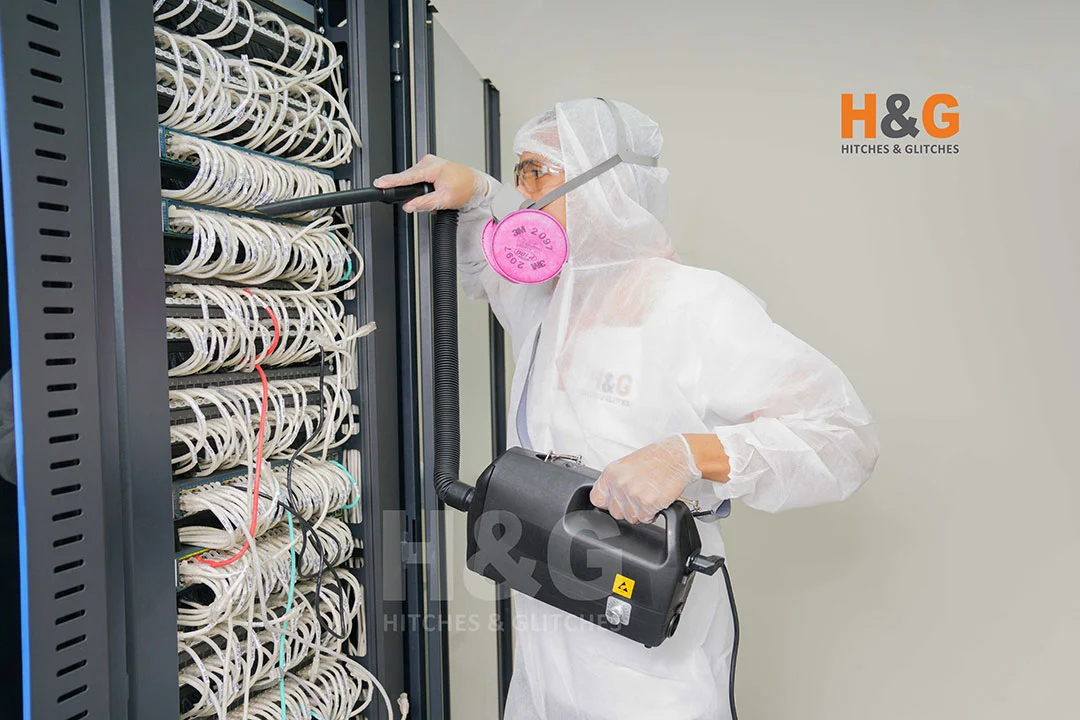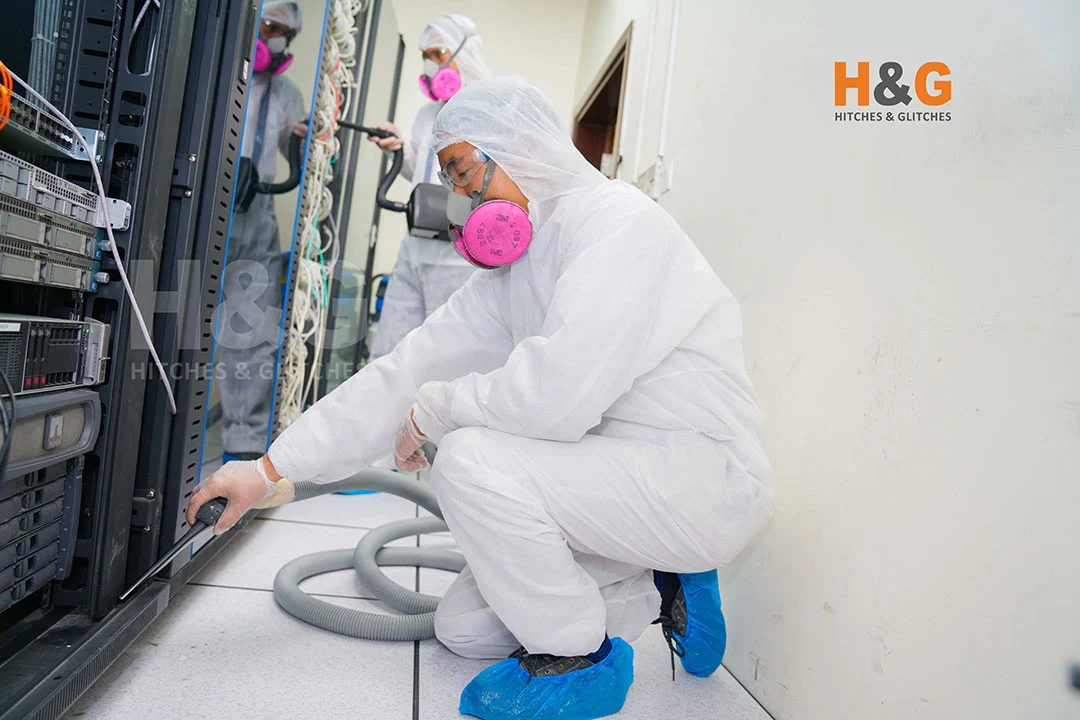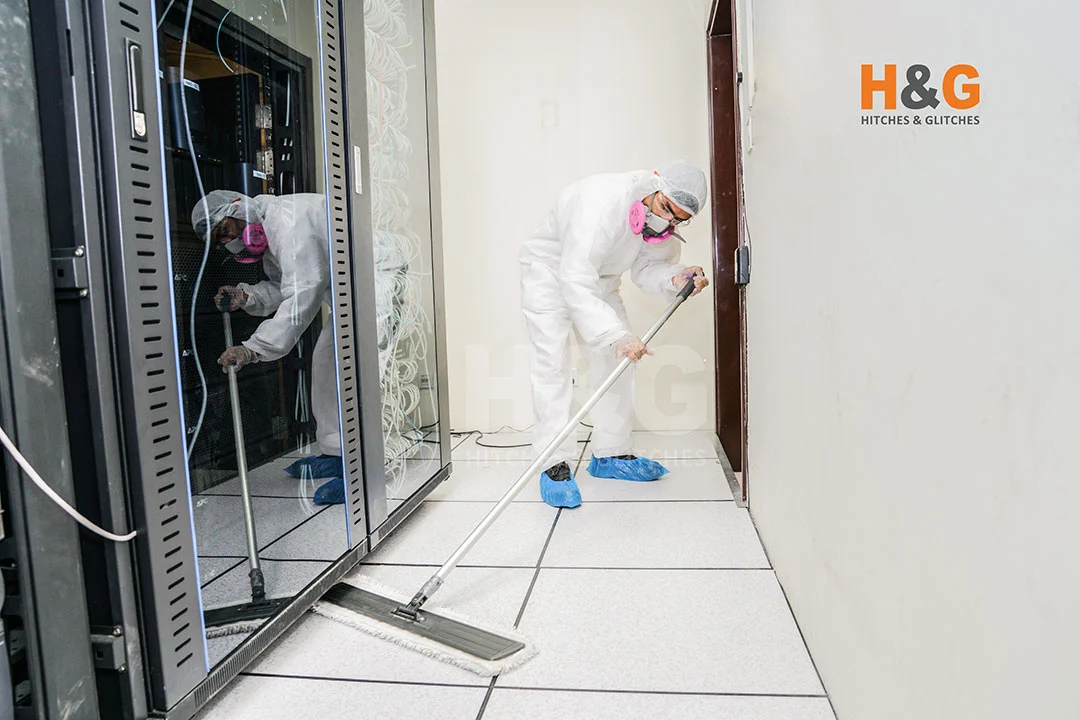
Data centers are essential for storing and managing large amounts of information that businesses and organizations need. Ensuring data centers’ proper maintenance and cleanliness is crucial to their performance, longevity, and overall efficiency.
Over time, these centers can get dirty, which can cause problems and make them less efficient and effective. Ensuring the proper cleaning and maintenance of data centers is vital to overcoming these challenges. To keep data centers in good condition, follow a regular cleaning schedule using trained cleaners and non-static cleaning tools.
In this blog, we will explore the best practices for data center cleaning. Our guide will assist you in reducing airborne contaminants. It will also help you organize cables and clean server racks without disrupting connections. Additionally, it will guide on keeping data center floors clean.
Why Data Center Cleaning Matters?
Data centers are home to a myriad of sensitive and expensive equipment, including servers, routers, switches, and other networking gear. Dust, dirt, and debris can accumulate over time, leading to a host of issues such as:
- Poor Air Quality: Dust in data centers can harm air quality, impacting staff health and equipment performance.
- Overheating: Dust on fans and vents can block airflow, causing equipment to overheat. This can lead to expensive downtime and permanent damage.
- Reduced Efficiency: Contaminants can hinder the smooth operation of components, reducing their efficiency and increasing energy consumption.
Further Reading: Why Does Data Center Need to be Cleaned?

Data Center Cleaning Best Practices
1. Regular and Systematic Cleaning Schedule
Establishing a well-structured cleaning schedule is paramount to maintaining a pristine data center. Divide the cleaning tasks into daily, weekly, and monthly routines. This ensures that every data center area receives the attention it needs without disrupting daily operations.
2. Trained and Certified Cleaning Personnel
Specialized skills are necessary to handle sensitive equipment to clean data centers without causing damage. Trained and certified cleaning personnel ensure that they carry out the cleaning professionally and precisely.
3. Minimizing Airborne Contaminants
To reduce the risk of airborne contaminants affecting equipment and staff, consider implementing air purification systems within the data center. High-quality air filters can significantly improve air quality and help mitigate potential health hazards.
4. Using Non-Static Cleaning Tools
Static charges can damage sensitive electronic components in the data center. Using non-static, anti-static, and ESD-safe cleaning tools and materials will safeguard against accidental damage while cleaning.
5. Focus on Cable Management
Good cable management keeps data centers tidy, organized, and safe by preventing cables from blocking airflow or causing accidents. Regularly inspect and clean cable pathways to keep everything well-organized.
6. Cleaning of Server Racks
Server racks are at the core of data centers, and their cleanliness is crucial. When cleaning server racks, exercise caution not to disturb or damage any cables, ensuring they remain securely connected.
7. Floor Cleaning and Maintenance
Datacenter floors need attention too, as dust and debris can accumulate, posing risks to equipment and personnel. Use non-abrasive cleaning solutions to avoid damaging the specialized flooring materials.
8. Labeling and Organization
Keep equipment, racks, and cables clearly labeled to make them easy to identify and avoid unnecessary handling during maintenance and cleaning.
9. Regular Equipment Inspection
Incorporate equipment inspection as part of the cleaning routine. Check regularly for signs of wear, loose connections, or potential issues to prevent future problems.
10. Data Center Contingency Plans
Despite all efforts, accidents and emergencies can still occur. To minimize downtime and data loss, create contingency plans for potential disasters like water leaks or fires.
What is the Designated Frequency for Cleaning a Data Center?
To keep your data center running smoothly, regular cleaning is essential. The cleaning frequency depends on the facility’s size, equipment type, airflow design, and environmental conditions. Here are some general guidelines:

Daily Cleaning: High-traffic areas like entryways and server room entrances should be cleaned daily to manage outside contaminants effectively.
Weekly Cleaning: Clean data center floors, under-raised floors, and hard-to-reach spots once a week to prevent dust buildup and improve airflow.
Monthly Cleaning: Conduct a thorough cleaning, including server racks, cable pathways, and air vents, once a month to remove accumulated dust and ensure equipment works optimally.
Quarterly Cleaning: Deep clean cooling systems, air filters, and precision equipment every three months for top-notch cleanliness.
Bi-Annual or Annual Cleaning: Consider more extensive cleanings every six months or once a year based on your data center’s specific needs. This may involve cable organization, equipment inspection, and collaboration with specialized cleaning services.
Remember, these are general guidelines, and your data center’s unique requirements may warrant adjustments to the cleaning schedule. Regularly monitor cleanliness and performance to find the best cleaning intervals for your data center.
How Much Does It Cost to Clean a Data Center?
The cost of cleaning a data center can vary for several reasons. Let’s look at what factors can influence the overall expense:
- Facility Size: Larger data centers might cost more to clean since covering the whole area takes more time and effort.
- Cleaning Frequency: If you need more frequent cleaning, especially for critical areas, it could lead to higher overall costs.
- Specialized Cleaning Services: Data centers often require specialized cleaning services to handle delicate equipment properly. These services may cost more, but they ensure valuable assets are well-protected.
- Complexity of Equipment: If your data center has intricate cabling and delicate server racks, the cleaning process might be more complicated, affecting the cost.
- Environmental Factors: Data centers in dusty or contaminated environments may need more frequent cleaning, impacting the cost.
- Additional Services: Some cleaning companies offer extra services like preventive maintenance and equipment inspection, which may increase the overall cost.
Since data center cleaning costs vary a lot based on these factors, getting quotes from reputable cleaning companies specializing in data centers is crucial. While cost matters, prioritizing service quality and the expertise of cleaning professionals is essential to protect your valuable data center assets. Investing in professional cleaning services will improve your data center’s efficiency, performance, and durability.
Further Reading: Are Data Centers Bad for the Environment? [Sorting Facts]
Conclusion
To maintain the performance and longevity of your data center equipment, it is crucial to adhere to proper cleaning practices. Following these practices will ensure that your equipment functions optimally and remains in good condition for an extended time.
To protect your data center’s performance and efficiency, create a cleaning schedule, hire trained data center cleaning professionals, and invest in maintenance.
Remember, a clean data center is a reliable data center.

